#Unfortunate implications
Text
Civilized Or Not
So there’s some common Zelda fanon I wanna talk about, relating to civilization tropes I think some of y’all haven’t really thought about in detail before, and that’s Hyrule (Zelda 1 &2 Link), Wild (BOTW mostly), and Ravio (LbW).
I’m using the Linked Universe names, because that’s where most of it comes up, because these things happen most often where you can contrast the boys with each other. This is often done, quick and dirty, by people assigning “roles” to each without much thought. Ravio’s unfortunately tends to be extremely pervasive outside LU spaces, too.
But, in brief, there is a trend for people to craft these characters in a framework of innocent vs savagery vs trickery that can have some really unfortunate implications I’m not sure many are even aware of. Hopefully I can explain better where these ideas come from, why they’re so easy and appealing, and why we should try to avoid repeating them for more than just the sake of “easy” but also to stop repeating some really nasty historical tropes.
I would start from what’s probably the simplest one to address: the tendency towards a “feral” personification of Wild. This tends to come from two places: Wild’s amnesia, and the collapse of society around him and his lost place in it.
Now, brain damage is complicated. You can lose a range of things to any given injury because of the way information is encoded differently and in different places. You can lose memory and/or skills and/or coordination and/or balance, etc, because it all depends on what got damaged. But in-game a lot of stuff suggests that Link retains things like speech, reading/writing, coordination, and martial skills. None of the people who knew Link prior to his injury suggest he seems changed in any way not attributed to stress and anxiety...
And, more importantly, real people suffer memory loss just like that in the real world. Treating him like he’s become “feral” due to memory loss is cruel to actual people living with brain damage today, and if you go there you should have a good reason for it.
Social collapse is a wide-spread theme in basically every Zelda game. The threat that the Big Bad poses is almost always the destruction of society as it exists: Malladus literally vanishes the infrastructure of New Hyrule in Spirit Tracks; the Twilight turns people into spirits living lives they don’t realize are questionably real in Twilight Princess; Veran freezes the passage of time to force people to work forever in Oracle of Ages. King Daphnes and Ganondorf under the sea vie over the fate of the world above in Wind Waker: keep what’s been made, or start all over again?
In modern culture, people tell a lot of stories about the fragility of civilization and what happens in its absence. You get the range from Lord of the Flies, in which children wrecked on an island attempt (and fail) to recreate civilization on their own, Kipling’s “The Jungle Book” in which Mowgli is treated as reckless and innocent, and a much more obscure piece from the 18th century “Paul et Virginie” (and likely many more I don’t know offhand.) Essentially all of them play with the question of how do people become civilized, and what happens when they do? In Lord of the Flies, the children were civilized and failed to maintain it; in the Jungle Book, the boy wasn’t civilized and innocently interacts with it. In Paul et Virginie, the children were (relatively) uncivilized on the (French colonized) Mauritius, raised by their mothers but when the girl was sent away, she becomes civilized and dies tragically to preserve it.
The two Links most removed from civilization are Hyrule and Wild. Wild “lost” civilization, losing both his memories of it and the structure of it. Making him feral, without manners, and without a place to belong is that kind of Lord of the Flies savagery mixed with Mowgli’s innocent playfulness: there isn’t a structure to adhere to, so he’s a savage. Whereas Hyrule is more like the Paul eg Virginie side: innocent of civilization, he remains pure and sweet and kind, unable to conceive of big concepts like evil or money or so on. Neither position permits them to interact with the civilization that is right there in front of them! Wild can buy a house; he has people who know and care for him. He has social connections and social rights. The world exists, but the fandom does not seem to want him to interact with it in favour of remaining “wild.” In Zelda 2 – a game explicitly set within a decade of Zelda 1 – there are whole towns with trade and a castle and massive structures with on-going life in them... but very few fans seem to ever reach into that story or relate it back to the first. Hyrule, the character, does not exist within Hyrule, the country.
Strangely, Wind Waker does not fall prey to this, I think because the structures are presented as fait accompli: Link wakes up with his grandmother and his sister, he has a defined home, and a society in which you spend the entire game forced to engage with. Zelda 1 & 2 were not sophisticated enough to waste resources on going as in depth in social terms (although such interactions absolutely exist in Zelda 2!) and BOTW leaves such interactions as optional: you can survive the game with minimal social contact... but it’s a choice to play with it that way, not the default. The ways in which this edges onto the noble savage trope, in which “uncivilized” tribes are either innocent or brutish (rather than complex social systems in their own right) is fairly obvious.
There is one other character in Zelda who gets treated to the question of whether he is an innocent, free of civilization and all its rigour... or something else. Ravio, coming from the devastated world of Lorule, can often wind up slotted into the scared, innocent child trope and unfortunately that’s the better position people frequently take. The worse one evokes the Merchant of Venice: the deceitful, Jewish merchant who values money over people’s lives.
Lorule (and Nintedo’s approach towards their humanoid Zelda villains in general) is near-eastern-coded in many ways, down to the fact that Yuga’s outfit is the spitting image of Ottoman dress. Yuga being a depraved bisexual (a common historical trope about Muslim men towards Christian men and boys), and Hilda being deceitful and conspiring against everyone she was once allied to are a backdrop to the ways in which Ravio is a greedy coward. He’s not an evil character in the game; the mechanic of penalizing death without being too severe is interesting and works well! But that doesn’t take away the stereotype, just like it’s not okay Nabooru is pretty explicitly predatory towards child Link in Ocarina of Time, too.
Arab and Jewish stereotypes often converge, because both people's originate from the same region, and both are hostile "Others" to Christian Europe and Nintendo doesn’t have a great track record of their near-Eastern coding in Zelda. It crosses the whole gamut from harem and amazon tropes with the Gerudo to breath-takingly anti-semitic or anti-black (Ganondorf being green, eg. non-human, in various incarnations), all packaged neatly in the ideal of medieval fantasy Europe. The scale would be impressive if it wasn’t so damn awful, but we can at least stop repeating it in our fanworks.
Wild doesn’t have to be feral to be a playful little shit; Hyrule doesn’t have to be pure and innocent to be kind. Ravio doesn’t need to be innocent or scheming, and he shouldn’t place money over Link’s well-being (If you chose to respawn at home, he is consistently only ever concerned for Link! Once you buy the items outright, he promises he'll still be there to take care of you.)
Do better. It’s more interesting that way, and I want to see that variety grow!
[If any of y'all would like me to dig up better sources on any point, I can do so but I didn't want to bog this post down further. I have largely left the anti-arab stuff alone because it's not the biggest issue with Ravio's fanon presence, which is the focus here.]
#Zelda Meta#Linked Universe#Ravio#LU Wild#LU Hyrule#antisemitism in media#noble savage tropes#bad tropes#Unfortunate implications#LOZ meta#LU meta#Long post#like 1200 words#I'm having a week okay#brain damage#mental illness
106 notes
·
View notes
Text
So I went to a local craft fair the other day. There was an artist there selling laser cut wood panels in various designs.
One of them had this quote:
"The bond with a true dog is as lasting as the ties of this earth will ever be."
Cute quote, yeah? Something you would probably enjoy hanging on your wall if you are a dog person.
Except.
They put it on a panel with a laser cut version of this image:

D:
I feel sure the artist had not seen FMA and just searched for a cute anime picture of a dog... and unfortunately picked the worst possible image to go with that quote. Because like. There's no way you'd use that image on purpose, right?
Right?
#fullmetal alchemist#nina and alexander#nina fma#unfortunate implications#dogs#the perils of using random google search images#fma#anime
34 notes
·
View notes
Text
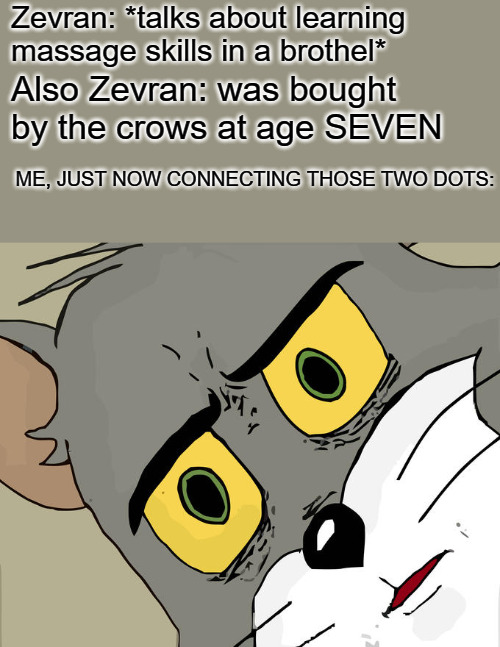
(Someone needs to call the cops on whoever in that brothel taught Zevran those "skills" and also on any recipients of those skills prior to Zevran turning 18).
#unfortunate implications#dragon age#dragon age origins#zevran arainai#zevran x warden#implied child abuse
14 notes
·
View notes
Text
[Spoiler]
Yeah, actually it is really fucked up that Thistle/Sissel died/chose to die and was allowed to make that choice when homicidal racist elf cop with the same acquired magical brain damage from being violated by a demon got to live/was convinced by folks to keep living.
Given Thistle's everything there's a host of unfortunate implications regardless of the mangaka's intentions with making that choice.
I'm glad someone pointed that out cause, it didn't really occur to me to think of it in those regards. I think I'll rewrite my post-canon fic to include Thistle choosing life.
(Hi! B4 you consider trying to argue with me about shit or dickride the mangaka, consider! Why the fuck should I give a shit about your opinions or let it stay on my post when I could delete it or block you if you annoy me?)
10 notes
·
View notes
Text

I STILL do!
(h/t to @poorfluffybaby)
3 notes
·
View notes
Text
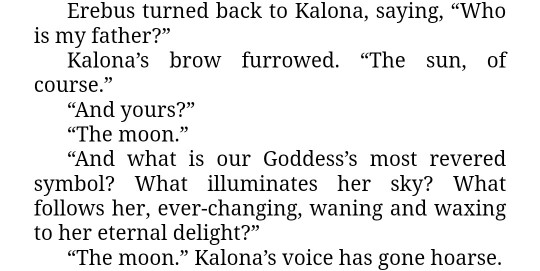
Wait. So... Kalona's father is the moon. And Nyx is represented by the moon. So Kalona's father symbolizes Kalona's lover.
... I mean, I guess the incest vibes match a lot of real world mythology.
2 notes
·
View notes
Note
Was it difficult getting the necessary paperwork to establish yourself in this realm after Neverland?
Interesting choice of words. Guess that's one way to put a Lost childhood.

The docs themselves weren't so bad, not a whole lot of people out there that are gonna give a lost, confused kid hell for not knowing any of his government info. Guess I've got all the cult crap in the news back then to thank. Culture shock, though... I wasn't used to the whole "child labor laws" thing. I had to double-back and fudge a few details to keep some kind of independence. After just skipping out of a group living kind of situation, I wasn't in any type of hurry to get back in it.
#* / postcards.#( if og casting doesn't take into account 'hey neither of these actors should probably be playing their teen versions#and having them cast for this section of flashbacks and having to make prop documents that try to account for it might end in some#Unfortunate Implications#homemade reasonable 'he prob lied on his docs to make himself older' will have to do )#( and evade evade evade on the neverland/magic trauma )#* / season one.
1 note
·
View note
Text
Just finished binge reading The Lunar Chronicles over five days
Haven't read this much in a week since the pandemic started, when I finished off The Underland Chronicles (wait a minute...).
Has anyone done a Levana Finds Out yet? That scene was crying out for it.
"We have lost sectors RM-9, WS-4, and LW-12. RD-6 and TM-3 remain in our hands."
"The army is loyal, we can call them up."
Silence. "My Queen, Regiment 117..."
#the lunar chronicles#nothing much to say just wanted to say i enjoyed the books#what's the deal with droid sentience anyway#unfortunate implications#amazon recommended acotar and holly black's stuff to me is this a multifandom i've stumbled into that likes#fairytale retelling#and other stuff#faerie#where the hell is mars#its still harder scifi than revelation space
3 notes
·
View notes
Text
I wish I could find the meta I was reading about the unfortunate implications of having your main (only?) black character be overly aggressive and violent. And that the other inquisitors think she's trash and beneath them.
#star wars (franchise)#star wars: live action tv#reva | third sister#racism#unfortunate implications#kenobi spoilers
1 note
·
View note
Text
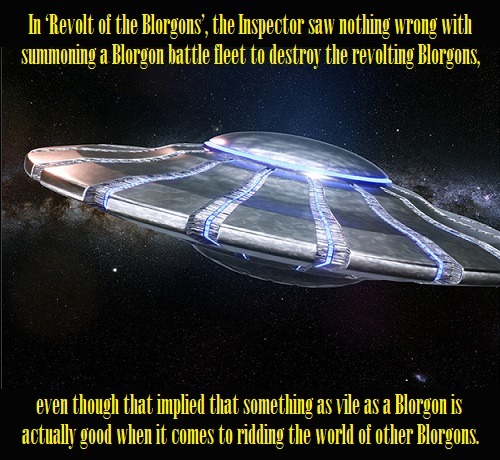
In ‘Revolt of the Blorgons’, the Inspector saw nothing wrong with summoning a Blorgon battle fleet to destroy the revolting Blorgons,
even though that implied that something as vile as a Blorgon is actually good when it comes to ridding the world of other Blorgons.
#Inspector Spacetime#Unfortunate Implications (trope)#Unfortunate Implications#Revolt of the Blorgons (special)#the Inspector (character)#saw nothing wrong with#summoning a Blorgon battle fleet#to destroy#revolting Blorgons#bad Blorgons#Blorgons#implied something as vile as a Blorgon#is actually good#when it comes to#ridding the world of Blorgons
0 notes
Text
Chapter 13: Husky's Depression
Ignas is walking in the kingdom, thinking probably racist thoughts until his friend Frye pops up behind him, calling him "Iggy".
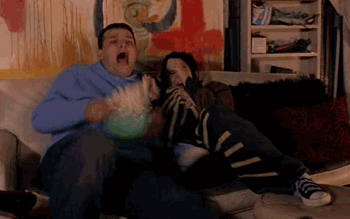
Frye came to check in on him since the whole "we got kitchenware instead of swords" thing has apparently become public knowledge. In actuality, Ignas tried to keep it secret but Frye found out because he's..."special". Ignas lets slip that +Anima were involved and this gets Frye's interest. He talks about Cooro, Nana, Senri and Husky and Frye, despite knowing about Ignas' issues with Kimunkles, tells him he shouldn't be prejudiced against Animas. Ignas then goes full Astaria History X by ranting about how in the past, all Kimunkle were +Anima and +Anima are still being born in Astaria, proving that the +Anima are invading the kingdom's bloodline.
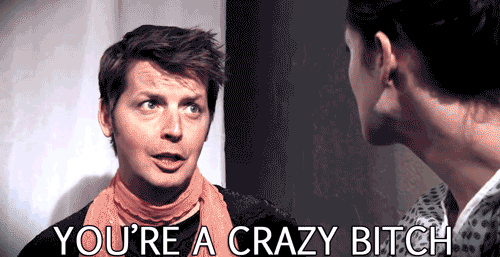
Frye basically goes "Yes, and?", saying that +Anima power needs to be accepted. Ignas just dismisses him as easygoing as they sit together platonically (maybe). However...mental images show that Frye knows who Cooro is...

Back to our group. Husky is catching fish and Senri is pressing flowers. Nana's bathing while they do all of that. Nana twirls around in her new clothes and Husky decides to put on his best Based behavior, saying that only a girl would make them wait for that.
Anyway, wash time. Cooro and Senri go off to bathe while Husky stays behind to rest. Nana notes that Husky never bathes but he never stinks either and his skin is so clear...this obviously means Husky must be a girl.
Revelation aside, the group travel to a town where they look at a map. Nana double downs on her "Husky's a girl" theory, saying he never washes with the others so he must be washing at night to cover up his girly bits. Cooro spots some stores and wants to go so Husky just lets him, designating the map as the meeting spot. He thinks to himself that he wants to be alone and Nana sees her chance...
Husky goes off by himself and looks at some jewels. Nana watches him secretly and thinks that obviously boys aren't interested in jewelry so point three, bitch! Husky spots her giggling like a creep and asks her what does she want. Nana asks him if he has a secret.

His obvious tell makes it clear he very much does. Then again, he exposes her cold-reading ass by pointing out that everyone has secrets. Nana drops the subtlety a bit by saying that, as a girl, Husky can tell her stuff that he can't tell Cooro or Senri. Freaked out, Husky tries to get away. Nana follows, trying to get him to try on dresses and style his hair. At his limit, Husky accuses Nana of trying to make fun of him and runs off, saying he hates girls. Ultimate Ally Nana is then approached by Cooro and Senri who asks what that was all about. Nana then says that Husky is a girl.
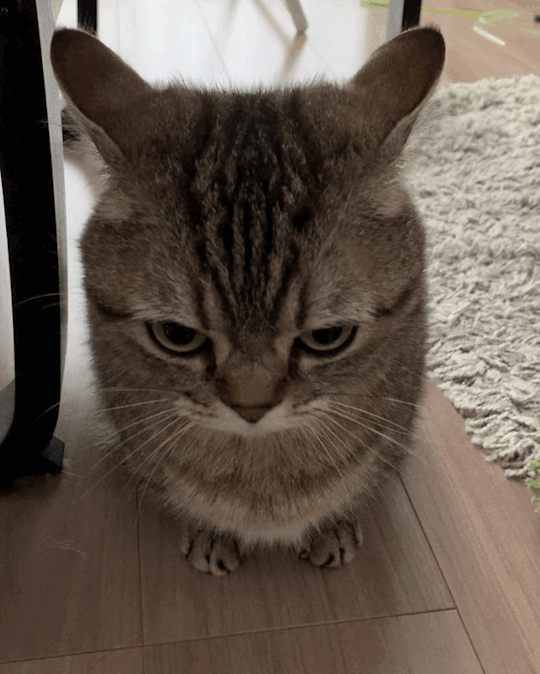
(After saying Husky can trust her with things and knowing that he was keeping it secret, she spills the beans. She's lucky she's young because I would write her off on principle otherwise.)
Anyway, Nana hypothesizes that Husky's dudebro misogyny is a cover for his "real" gender identity. Cooro points out he used to work as a mermaid princess...but then again, Husky has explicitly told him he's a boy. Nana points out that it's weird he would have to go through the trouble of saying that (It's not like cis people are born with naturally androgynous looks so they have to establish their gender all the time in real life and presumably in-universe, right?). Nana goes further down the fake ally hole by declaring if Husky won't come out, she'll expose him by force.
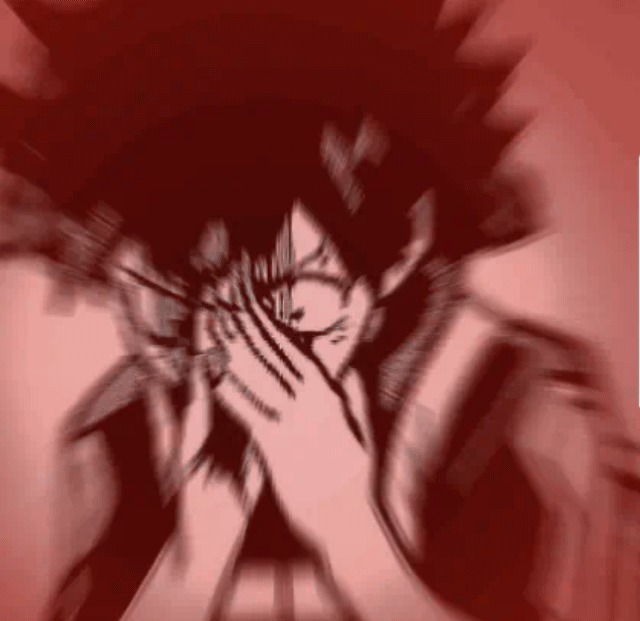
(You're testing me, child...)
Husky flashes back to his childhood where people said...the same shit Nana is saying now, saying he's slender and delicate like a girl. Then they start bullying him, telling him to wear a skirt if he's gonna go out...
Husky is sitting on barrels, stewing in his freudian excuse as some guys come up and start to flirt with him. When the group catches up with him, he's beating them up with his stick. The group breaks it up as Senri runs in to snatch him up and runs off with him. When they're alone, Nana tells him that she told him her biggest secret (how she became an +Anima) so...she uses her ultrasound to knock him out and put him in a dress while he's unconscious.
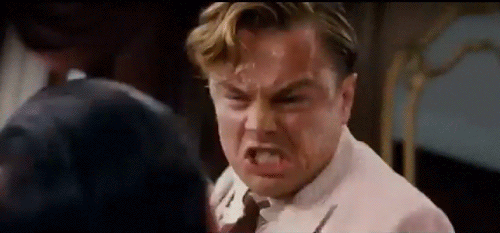
FUCK IT, I TRIED. I WAS AN ADULT. I GAVE HER THE BENEFIT OF THE DOUBT. I HATE NANA NOW. FUCK HER AND HER UGLY ASS WINGS.
Husky literally has to check if his bottoms were left untampered with before turning to Cooro and telling him to strip (I'm so mad that I can't even make a joke about that). Then Husky himself gets naked to prove he's a guy. Why did Cooro have to join? For reference. Nana is stunned, asking if he's a guy, why doesn't he bathe with the guys? Nana let an itsy-bitsy detail escape her: HUSKY IS LITERALLY FISHING FOR THEIR MEALS MOST OF THE DAY. The chapter ends.
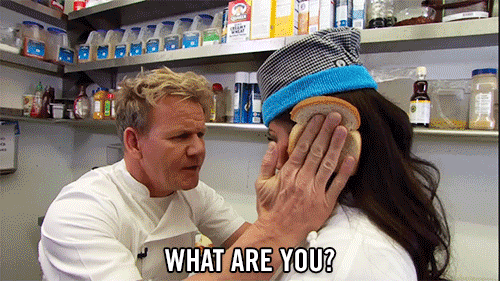
#+anima#manga#review#tw: transphobia#i know there's no real transphobia in this story (I suppose)#just juvenile stupidity that hasn't aged well#but i tagged it in case because damn#nana lost a lot of points today#her actions are disturbing in context#i don't want to think about how they come off out of them#unfortunate implications#to the max
0 notes
Text
Bonus Riku doodle

#the implication ere is that Riku is just kinda standing there without showing how much hes thinking about sora unfortunately-#in canon this isnt something he can actually do. so KJANSKJDN#Canon riku looks at sora asks “is anyone gonna gush about this guy” and not wait for an answer#Dream drop distance#kh ddd#kh riku#soriku#riku kingdom hearts#sora kh#riku kh#bev draws#beverly says stuff
315 notes
·
View notes
Text
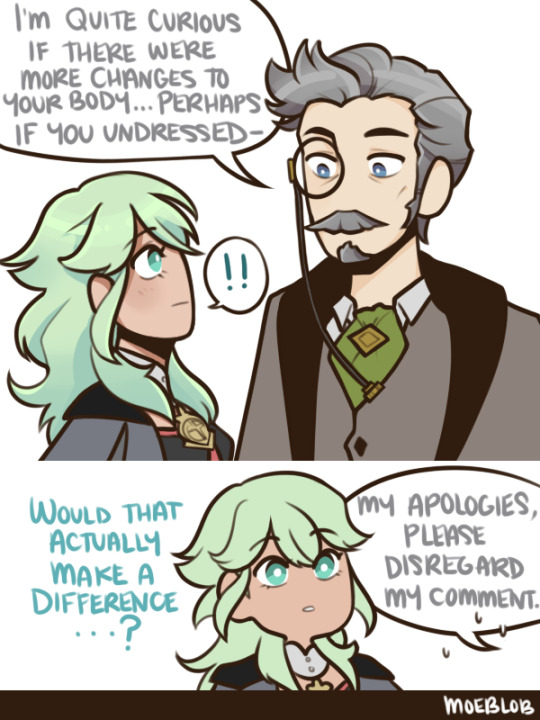
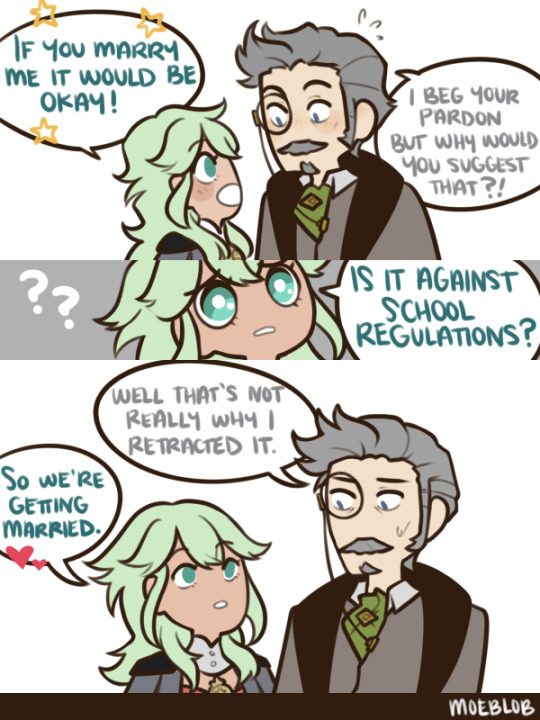
Sorry I forgot Hanneman suggested Byleth undress after they show up with a different hair color. And I miss Hanneman. And also while swapping between Houses and Hopes and seeing Hanneman pop up to help in a Hopes paralogue is just devastating since he doesn't ever actually join you at all and I am denied my old man rights.
So I had to draw this. Thank you for understanding.
#fe three houses#byleth#hanneman von essar#i like that Byleth just kinda stares at him and he realizes WHAT HE SAID and the implications and is like#step back uh forget that I said that#like man so zoned in on research he blurts that out and has to backtrack mentally to AH socially bad to say that my bad#if i need to tag this as anything lemme know even though it is a conversation in game basically (minus the marriage)#also if you have never married hanneman i genuinely enjoyed his s support and was VERY surprised and hes just#honestly one of my favorites overall in 3h ?? and im still bummed i cant play as him in thropes like thats just mean#also i think if byleth was like oh well if its awkward to see someone undress randomly#then marriage would solve the awkwardness this is truly the best deduction#which is really funny that i can see it happening with both leths despite my hc of them#with fyleth as bi and myleth as ace i think both would just be like AH cool we can avoid awkwardness by marriage#and hanneman just wants to go lie down in a ditch because he said something like that#and and byleth doesnt even know about religion while working at church school they dont know about school regulations#that wasnt really on their mind to check ok just saying you could tell byleth no to something#and then they just go oh school policies i understand unfortunately#and the person is like no we just meant its frowned upon to do archery practice in the tea garden its not technically illegal just dont??
157 notes
·
View notes
Note
would you be able to give examples/explain more about how race only impacts gideon in the tlt-universe? not being facetious or condescending, genuinely asking. thank you!
Hi anon! If you mean my tags to this post, I wrote
#earth conception of race doesn't impact any character in the series except the canonically brown main antagonist
By which I mean my Worstie and main antagonist of the series, John Gaius (PhD).
I don’t think TLT as a series engages with race in any especially meaningful ways. It’s set in a post-Earth society with entirely different social norms, and there’s no concept of race and ethnicity within the population of the Nine Houses. Physical descriptions of the characters are scarce to say the least, and they rarely spell out the kind of features that suggest specific racial connotations, because the POV characters don’t seem to think it’s something worth remarking upon. iirc, it takes until halfway through HtN for the narrative to confirm that Harrow has brown skin.
[See also Tamsyn’s GtN characters description post. It quotes passages from the book, and you can see how minimal the descriptions are, and she repeats several times that her characters’ appearances are up to the readers’ interpretations. It just doesn’t seem to be a big concern of hers]
Then there’s John, who grew up in twenty-first-century New Zealand and IS explicitly Māori in a way that absolutely impacted his character arc. It's not A major theme of his Nona chapters, but it’s there if you read between the lines. The boarding school he went to, which IRL had a high percentage of low-income Māori students on scholarship. The depth of his climate anxiety, his uncompromising “Nobody left behind” stance before the cryo project was halted, and his fervent hatred of ‘the trillionaires’ afterwards... these are all informed to some extent by his background as an indigenous man imo, and so was the global reaction to his developing powers. The “We were going to put you fellas in jail, weren’t we?” the way his initial attempts at publications are all flat-out ignored by the scientific community and dismissed as culty gimmicky faith healing until he leans into it.
John being Māori is just one of the many pieces of his backstory, and far from the most impactful to what eventually went down, but my point remains that he is the ONLY character in TLT whose racial background 1) affects his story arc and 2) is relatable to the audience. Everyone else is ten thousand years removed from Earth, and I’m just not very interested in using racial identifiers when exploring these characters and their dynamics, because the characters themselves don’t care and neither does the narrative.
#on a more hashtag meta level#John is why I’m personally uneasy about any analysis of the series that tries to interpret TLT through racial allegory lenses#especially when it’s weaponised for discourse purposes#You can write meta about John’s war crimes without comparing him to white imperialism#Or you can go ahead and do that anyway but I highkey disagree that it’s a fitting metaphor or in any way deliberate on Tamsyn’s part#and I think the implications are unfortunate to say the least#That said I AM extremely interested in the ways John relates to the culture he left behind#and why he made the choices he did when it came the moment to reshape humanity’s cultural consciousness after the Resurrection#but that’s on a character level!#I don’t think we can apply twenty-first-century social / identity labels to the series as a whole#especially a series where the author says 'I imagine X character as Y but it doesn't raelly matter'#and it doesn't influence the canon directly in any way#SORRY THIS IS LONG!#anonymous#ask#ejg#tlt thoughts#elle tlt posting#tlt
353 notes
·
View notes
Text
Thinking abt body horror as romantic. Body horror as intimate recognition of the self and the other and the other as the self. Body horror as an encounter with the divine.
#franposting#uhhhh sorry to all my homies who dont like horror but i am going thru it#and coming to some realizations about the grotesque and the bone deep body horror of the world. and its beauty and trust#is it a byproduct of an Overmanicured aesthetic obsessed culture or i am just Like That. maybe both#anyway. viktor arcane augmentation machine herald as both wonderful horror and terrible grace#smthn smthn the presger and translation state anne leckie#smthn smthn im from THE weekly divine cannibalism religion and we honestly don't talk enough about that and its implications#in a literal physical not vaguely spiritual allegory sense#honestly tlt gets at this too but it doesnt hit as much#anyway. read a trans persons thoughts on body horror and its like. fuck. you get it.#maybe not for the same reasons I get it.#but there is this. this core here.#anyway anyone have good body horror recs but like NOT visual. text. im weak stomached unfortunately to visuals#and like not in a gratuitous way. its gotta be philosophical body horror. the existential exploration of it all#horror as a genre of genuine art and contemplation. babygirl im so sorry i overlooked you for so long#not that the examples ive listed are horror#but are tapping into that thread im seeking#perhaps its not truly horror. it sure is smthn tho. and as always remains beyond my grasp#smthn smthn see in a mirror dimly etc etc
349 notes
·
View notes
Text
So something has been bugging me for a while now about A and N’s backstories, and while I know not everyone will be as pedantic as me, as someone who loves history and has done a lot of writing, I feel that if you’re going to write a story about vampires and give them a specific time and date of origin, then there should be a certain level of research that goes into making that background authentic. I'm not saying that Mishka didn’t do any research. It just seems that in order to keep the vibe of a happy, mellow fantasy some of the less savoury aspects of A and N’s upbringings have been left out, and it's a shame. To be honest, it feels a bit disingenuous, and it feels like an opportunity got wasted.
Let me explain (long post got long, it's 2am)
Let's take A first, since the problem is simpler here.
A is the child of a Norman lord and an Anglo-Saxon noblewoman, born in the first generation after the Norman Conquest of England in 1066. A says that these were turbulent times but that their parents had a happy marriage. Which. While I’m sure a lot of unions in that time period made the best of it, I can’t help but feel this description strips away a lot of the context of what was going on at that point in history - and removes some of the complexity about A’s thoughts on love and relationships.
Basically, after he took control of the throne, William the Conqueror stripped many Anglo-Saxon lords of their lands and titles so he could give them to his Norman buddies instead - with the added bonus that it left the Anglo-Saxons without the means to raise armies against him. The sisters, daughters, and widows of the dispossessed Anglo-Saxons were then forced to marry these new Norman lords to legitimise their power, not infrequently after all of their male relatives had been slaughtered. It’s not as if Anglo-Saxon women weren’t used to being used as political chess pieces, but the years after the conquest were brutal. It’s why William had to build so many castles. The point that I’m trying to make is that even if A’s mother was content enough in her daily life, due to the power imbalance between her and her husband, it's very likely she had little choice in the matter. She may have seen a lot of her family killed for political reasons, with the knowledge that – in an age where women had very little protection outside of their paternal household – she might be next if she made too much of a fuss.
It would be fascinating to see what effect that tension has had on A 900 years later, or even to get an acknowledgement of how much times have changed, but we don’t. We don't see how their early years affected them, how they view relationships formed naturally instead of via political contracts. And I really, really wish we did. There is so much potential there.
But A is not the one keeping me up past 2 in the morning. It’s N, and the utter detachment their backstory seems to have from the period in history they lived in as a human. And it all stems from the fact that they came from the English nobility in the late 1600s.
See, the bulk of the problem is that English inheritance law at the time heavily favoured primogeniture, where a man’s wealth would go to his first-born son. Some dispensation was made for widows and other children, but the estates, assets, and most of the money had a very clear destination.
For one thing, this makes it kinda weird that N’s stepfather would have needed an heir before he could inherit, because except in extreme circumstances everything would have gone to him anyway. Don't get me wrong, this isn't the worst part of the problem, it’s just annoying when there are more plausible reasons for him marrying a woman already pregnant with another man’s child (old family friend wanting to save her from disgrace, needed the dowry to pay off gambling debts, there was a longstanding betrothal between them that would have been tricky to get out of, etc.).
No, the bigger problem with N’s backstory vs primogeniture is firstly that at the time the English aristocracy was racist af (still is tbh) and given his pretty obvious mixed-race heritage, no court would have agreed that Nate was a legitimate son (this is for a very special reason that we will be coming back to). I say Nate specifically here because primogeniture requires the eldest legitimate son. Nat wouldn’t have inherited at all, as women in that period passed from the guardianship of their father (or other male blood relative) into that of their husband after marriage, and only gained any kind of independence with widowhood. If N had been an only child, maybe they would have been treated as a special case, but unfortunately Milton exists: the eldest legitimate son who by law will inherit everything.
Now here’s the thing. Your average aristocrat in the 17th century is very obsessed with lineage and keeping the family line unbroken. He would not, therefore, send his legitimate heir to sea to be shot at or drowned before he can carry on the family name – that joy instead goes to any other sons who need their own profession, because again, they will get very little. Nat would have had a dowry, but would never have been expected to make her own living, so I'm going to focuson Nate for this next bit.
In Book 3, if you unlock his tragic backstory Nate tells you he joined the Royal Navy after Milton went missing so that he could go look for him. And, well. This is where his backstory as Mishka tells it completely falls apart. For two reasons:
1. Even in the modern day, you can’t ‘just’ join the Navy, and you certainly can’t just jump straight to being a lieutenant – it takes years of training and after a certain age they won’t take you because they won’t be able to mould you easily enough into a useful tool. For most of the Navy's history, the process was even more involved. It wasn’t an office job you could just rock up to and then quit if you felt like it, it was a lifetime commitment. Boys destined to be officers would be sent to sea as early as 12 to learn shipboard life, starting at the bottom and moving up the ranks. These were gained by passing exams and by purchasing a commission – which is why you generally had to come from wealth to be an officer at all. Once you get to lieutenant you're responsible for a lot of people, and might be tasked with commanding any captured ships alongside the daily running of yours - it was not an easy job.
2. Even as a lieutenant (one rank below Captain, with varying levels of seniority) it’s not like you can just go where you want. In the 1720s British colonies already existed in India, the Caribbean, and up the entire eastern seaboard of North America and into Canada, and the Navy was tasked with protecting merchant shipping along these seaways (and one trade in particular that we’ll be getting to, don’t worry). Nate could have ended up practically anywhere in the burgeoning empire. He would not have been able to choose whom he served under, and would not have been able to demand his superior officer go against orders from the admirality to chase down one lone vessel because he thinks another one of the admirals might be a bit dodgy. It could not have happened.
Besides these impracticalities, there’s a far easier way for the child of a wealthy man to get to a specific point on the far side of the globe to look for their lost sibling, which is the route I assume Nat took sine she couldn’t have joined the Navy (yes she could have snuck in but she’s specifically in a dress in the B2 mirror scene so). All they'd have to do would be to charter a ship and tell the captain where to go, which is the plot of Treasure Island. It's quicker, less fuss, with less chance of things going wrong. It's even possible in the age of mercantilism that the Sewells had some merchant vessels among their holdings that could be diverted for the task. Why go through the hassle of joining the Navy and potentially ending up on the wrong side of the world when you can just hire a ship directly?
If Nate does have to be in the Navy (and let’s face it, it’s worth it just for the uniform) then it's far more plausible is that, as the illegitimate son who would not inherit because of racism etc, he got sent to the Navy as a boy and rose through the ranks to become a lieutenant. When he got news of Milton’s disappearance not far from where he was stationed, he begged his captain to go investigate in case whatever happened turned out to be the symptom of a bigger problem. Like pirates.
I like this version better not just because it makes more sense, or because it keeps Nate’s situation re: inheritance closer to Nat’s and therefore makes their stories more equal, but also because it adds a delicious amount of guilt to Nate’s need to find his brother. We know his entire crew died looking for answers, because he was selfish – that’s roughly 100-400 lives lost because of him, and we know that sort of thing eats at him.
So that's one side of the story, but if Milton wasn’t in the Navy, what was he doing on the other side of the Atlantic in the first place? Well, this is where we come to the biggest elephant in the room regarding N’s backstory as a member of the 17th century English aristocracy and potentially as a naval officer: the Atlantic Slave Trade. If you are wealthy in 17th century Britain it's more than likely that your wealth comes either from the trade itself, or from the products made with the labour of enslaved people. If you are wealthy, you want to protect your assets from attack by pirates or foreign powers so you don't become less wealthy, and that is what the Navy is for.
Regardless of N’s own views on slavery at the time – and any subsequent changes in opinion – it’s likely their family owned or had shares in slave plantations in the Americas. As distasteful as it is, it makes far more sense that Milton was on a trip to check the family’s holdings when his ship - specifically a merchant vessel - went missing. From a pirate perspective, a merchant ship would make a much better target than a Navy vessel, being slower, more likely to have valuable cargo, and less likely to have marines or a well-trained broadside.
It's not surprising that Mishka left out the subject of the slave trade given her tendency to skirt around darker subjects and general blindspot for racial politics, but it is nuance that, if it was there, would create a more grounded and coherent backstory for N that doesn’t have quite so many holes. Like with A being the child of an invader and his war bride, we could get some deeper thoughts from N about their place in the world - How do they feel to have grown up so privileged when others who looked like them were regarded as literal property? How did they feel being part of the system that made it happen? Did it inform their compassionate nature? Is it still a source of guilt or someithng they've tried to make up for?
I'm not sure where I was going with all of this. It's late, my sleep pattern is fucked. The tl;dr is that giving the vampires' backstories historical context would make them feel more multifaceted and would give opportunities for character growth that are instead missed because of a desire for a more sanitized version of the past.
#thank you for coming to my ted talk#the wayhaven chronicles#twc#a du mortain#adam du mortain#ava du mortain#n sewell#nate sewell#nat sewell#it's annoying because it’s such a small tweak in the grand scheme of things#If she didn’t want unfortunate implications she could have made N from a century later when the navy was actively trying to stop slavery#A could have been from a 50 years earlier to tie his whole family’s demise into the subjugation of the english after the battle of hastings#or a century later when the two courts had mostly integrated#mishka made choices#they deserve to be given more substance than mere aesthetics#you can tell it’s late I’m using long words
198 notes
·
View notes